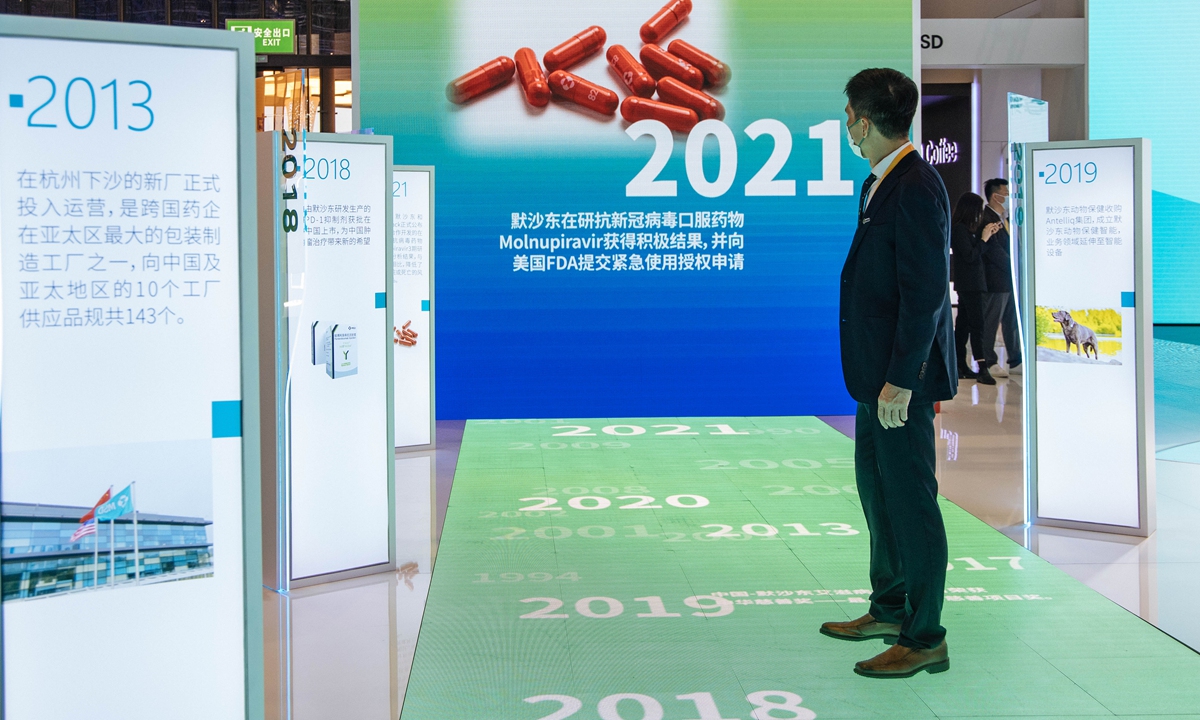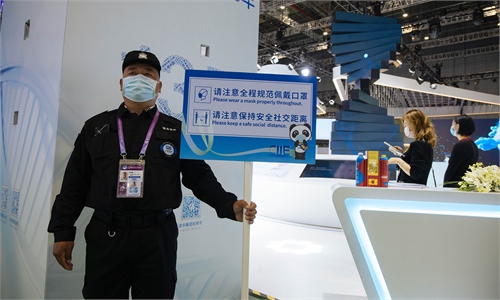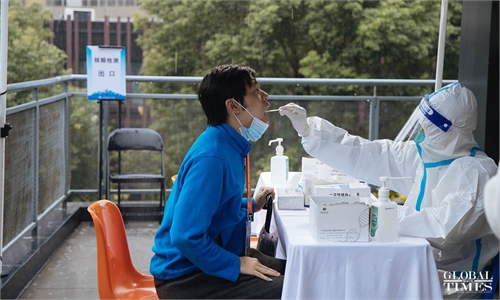US companies swarm CIIE for ‘the right reason’, ‘cautiously optimistic’ on trade
New record for attendance, ‘cautiously optimistic’ on trade

Photo: Li Hao/GT
American companies are fielding an even bigger presence to the 4th China International Import Expo (CIIE) and US exhibitors are saying they are cautiously optimistic about the prospects in trade with China, amid a recent flurry of diplomatic activities between the two countries.
The number of American companies coming to the CIIE reached a new high at the fourth edition of the import fair to over 200, Xinhua News Agency reported on Friday. The number of US companies for the first three CIIEs was 180 in 2018, 192 in 2019, and 198 in 2020. Companies from the US already occupied the largest display space at the 3rd CIIE last year. CIIE is the world's largest import expo.
Exhibitors include CIIE veterans such as Ford and 3M and newcomers such as Amazon and healthcare company Baxter.
To be on the ground of the CIIE offers immeasurable opportunities for networking and market exploration, US business chambers and exhibitors said on Friday.
Chinese analysts said US companies show rising enthusiasm in CIIE, and are wooing the Chinese market, which has up to 700 million middle-class consumers. They said it is the right choice that could augment their sales as COVID-19 continues to batter the world economy.
The enlarged presence from the US came after two rounds of trade talks between Chinese and US senior officials in October, and leading US companies from Apple to Starbucks to Coca-Cola's released quarterly sales data suggesting an increasing reliance of US corporations on the vast and growing Chinese market.
It also came as major energy sector deals were inked on Thursday between China's Sinopec and US venture Global LNG, which agreed on a massive, 20-year-long, 4 million-ton liquefied natural gas (LNG) deal said to be very helpful in fulfilling China's commitments to the phase one trade deal. Under the deal, China pledged to buy $200 billion worth of US goods and services.
Cheniere Energy, the US' largest LNG exporter active in selling China LNG since the Trump era, is also present at the expo.
The US-China Business Council (USCBC) confirmed with the Global Times that many of its members are attending the CIIE and said they are upbeat about their China business, most of which involves manufacturing in China for China.
USCBC said in an interview via email that although travel restrictions due to the pandemic have limited participation, members that have attended in the past find it useful, especially the networking opportunities.
Regarding the phase one deal, USCBC said sales of agriculture products and more recently energy products are approaching commitment goals, while others are lagging with only a few months left until the agreement ends.
USCBC recently released a report stating most US Congressional districts' exports to China have bounced back in 2020, following a record low in China-US trade in 2019, and called for the removal of tariffs.
Member companies are cautiously optimistic that the recent flurry of diplomatic activity, including a likely meeting between both presidents before the end of the year, will ease tensions and stimulate more trade, the USCBC told the Global Times.
"Which country attaches the most importance to the CIIE? I would say it is the US," said Wei Jianguo, former MOFCOM vice minister and executive deputy director of the China Center for International Economic Exchanges.
American companies need the CIIE to probe the Chinese market, as well as their competitors, gauge and measure China's business environment and formulate their business strategies, Wei told the Global Times on Friday."This is a moment of America First."
US companies, burdened by the domestic market's slack sales, slowing economy and piling debt issues, seek at the CIIE a direct sales channel to the vast Chinese market to boost their sales, according to Wei.
On the important soybean trade, for which China has a rigid demand and the US has stocks to sell, the exhibitors are also quite optimistic. China is the world's largest consumer of soybeans, importing more than 100 million tons in 2020.
Jim Sutter, CEO of US Soybean Export Council (USSEC), told the Global Times in an emailed interview that the USSEC has 13 US soy export companies participating in the 4th CIIE at the USSEC booth, with some having their own booth.
"Several are planning to sign purchase agreements with importers at CIIE 2021," Sutter said, noting that the signing signifies the important relationships that exist.
According to official export statistics, US soy exports to China reached 34.2 million in 2020, and in the first eight months of 2021, the US exported 7.9 million tons, which is 19.7 percent or 1.3 million tons higher than the comparable year-to-date period in 2020.
"It is great to see the US back in the role of being an important soybean supplier to customers in China," Sutter said.
All soybean purchases by Chinese importers strengthens trade ties between China and the US which should be viewed as a positive contribution to the mutually beneficial trade as described in the phase one deal, Sutter said.
Zhang Xiaoping, USSEC's Greater China regional director, told the Global Times at the CIIE on Friday that he expects the signing volume to be far bigger than in the last CIIE, and on-spot signing has been a delight.
Chinese analysts said in order to let China-US trade further expand, the Biden administration needs to do more to create a more favorable environment - both from the political and supply perspectives. These efforts would involve some of the thorny trade issues, including the US' removal of tariffs on Chinese products, analysts said.
The USCBC said more than 80 percent of members reported profits in 2020 and 2021.
China-US trade grew 35.4 percent year-on-year to $543 billion in the first nine months of 2021, Chinese Customs statistics showed. The US was China's third-largest trade partner.



